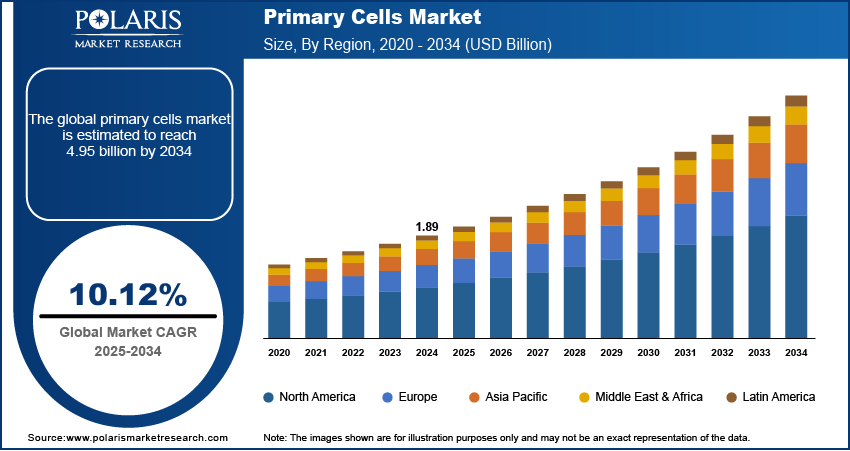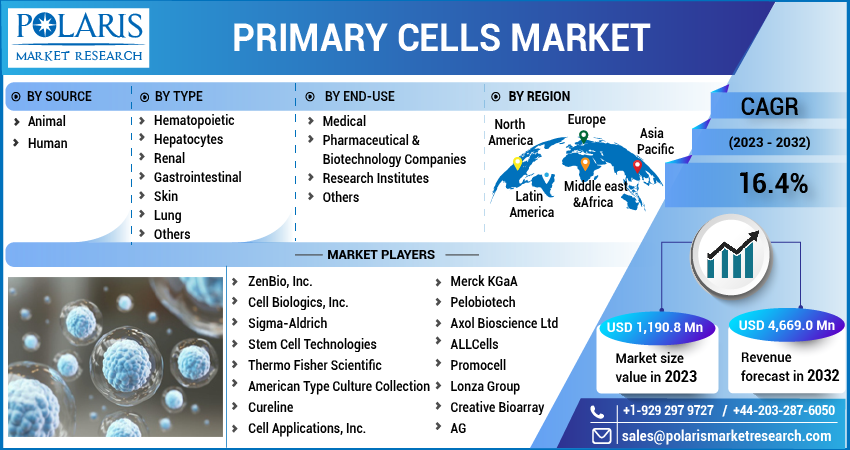
Primary Cells Market Share, Size, Trends, Industry Analysis Report, By Source (Animal, Human); By Type; By End-Use; By Region; Segment Forecast, 2023 - 2032
- Published Date:Jul-2023
- Pages: 116
- Format: PDF
- Report ID: PM1840
- Base Year: 2022
- Historical Data: 2019-2021
Report Outlook
The global primary cells market was valued at USD 1,082.7 million in 2022 and is expected to grow at a CAGR of 16.4% during the forecast period.
Primary cells are derived directly from the living tissues of animals or humans and are processed for use in various cell therapies. They find wide applications in stem cell therapy, virology, tissue replacement, cancer research, and 3D cell culture. Using primary cells in 3D cell culture enables researchers to study cell biology, biochemistry, drug effects, cell signaling, and cell-pathogen interactions.

To Understand More About this Research: Request a Free Sample Report
In the pharmaceutical industry, primary cells investigate drug cytotoxicity, produce biomolecules, and develop vaccines. By using primary cells, the reliance on animal models in vaccine development is reduced. Primary cells also play a crucial role in detecting and isolating viruses, aiding in understanding the mode of infection.
The primary cell culture market is witnessing growth driven by factors such as the increasing geriatric population, rising incidence of chronic diseases, and advancements in research and development. The global pharmaceutical market attracts substantial investments in developing and testing advanced drugs.
Primary cells are extensively used in stem cell therapy, 3D cell culture, virology, cancer research, and tissue replacement. Their versatility enables researchers to explore various aspects of cell biology and biochemistry, study drug effects, investigate cell signaling, and examine interactions between cells and pathogens. The market for primary cell culture is expanding due to demographic trends, the prevalence of chronic diseases, and the continuous progress in research and development, particularly in the pharmaceutical sector.
The growing prevalence of chronic disorders drives the demand for advanced therapies, resulting in an expected boost to market growth in the coming years. In 2020, the American Cancer Society estimated approximately 16.9 million cancer patients/survivors worldwide. The World Health Organization also reported that 71.0 million people globally suffered from chronic hepatitis C infection in the same year.
The pharmaceutical sector utilizes primary cells for various purposes, including examining the cytotoxicity of drugs, producing biomolecules, and developing vaccines. By using primary cells, the reliance on animal models for vaccine production is reduced. Primary cells also play a significant role in detecting and isolating viruses, enabling the analysis of infection modes.
Primary cell cultures are employed to investigate the cytotoxicity of new drugs. They are valuable for the industrial-scale synthesis or production of a wide range of biomolecules, particularly in the pharmaceutical industry. Numerous research projects on cell-based therapeutic products using primary cells are currently being developed. Primary cell cultures serve as alternatives to animal models for testing the results of new cosmetics, chemicals, and drugs. They are also utilized to specify the maximum allowable dosage of new medicines. These factors are expected to drive the growth of the market.

For Specific Research Requirements, Request for a Customized Report
Industry Dynamics
Growth Drivers
Increasing Prevalence of Cancer and Related Disorders
The prevalence of cancer and related disorders is rising, due to increased adoption of primary cells in various applications. Primary partitions can be manipulated to exhibit cancerous properties through exposure to chemicals and radiation, enabling the analysis of drug effectiveness, signaling pathways, and treatment side effects. Additionally, primary cells are instrumental in developing genetically engineered proteins like insulin and monoclonal antibodies.
The demand for primary cells has surged due to the growing adoption of stem cell therapy worldwide for cancer and genetic disorder treatment. Primary cell cultures play a vital role in generating cells for tissue regeneration or replacing deficient cells in the body.
Several factors are expected to drive the growth of the primary cell culture market. These include technological advancements, the rising incidence of cancer-related disorders, and the increasing need for drug development targeting cancer and genetic diseases. The demand for monoclonal antibodies, genetic engineering, virology applications, and the expanding markets in developing countries also contribute to market growth.
Governments worldwide are introducing regulations to support the expansion of the primary cell culture market. Economic growth in countries such as China, Japan, and India, coupled with increased healthcare and pharmaceutical expenditure, also influences the global primary cell culture market. Major international players are expanding their presence in these countries to capitalize on market potential, further driving primary cells market growth.
Report Segmentation
The market is primarily segmented based on source, type, end-use, and region.
|
By Source |
By Type |
By End-Use |
By Region |
|
|
|
|
For Specific Research Requirements: Request for Customized Report
Human segment accounted for the highest market share in 2022
The human cells segment accounted for the highest market share due to the substantial increase in global cancer cases. Human primary cells offer a superior cell culture system that can generate physiologically relevant data. The growing demand for human cells as an in vivo representation in various applications, including drug discovery, gene therapy, and cancer research, further drives the need for primary human cells.
Primary cells offer a more accurate representation of human biology and physiology than primary cells derived from other species. Researchers and scientists require cell models closely mimicking human conditions to study disease mechanisms, drug responses, and therapeutic interventions. Human primary cells provide a valuable tool for these studies, due to high demand and market dominance.
Hematopoietic segment accounted for largest market share in 2022
Hematopoietic segment accounted for the largest market share in the global primary cell culture market. This dominance can be attributed to their wide range of applications in cancer research, toxicology screening programs, drug development, and environmental testing, which have increased demand for these cells. Furthermore, the growing adoption of hematopoietic cells in stem cell therapy has further amplified their demand in the market.
Hematopoietic stem cells are responsible for forming all blood cell types and can self-renew and differentiate into specialized blood cells. They are widely used in hematopoietic stem cell transplantation, a common treatment modality for various blood disorders, including leukemia, lymphoma, and certain genetic diseases. The growing utilization of hematopoietic cells in stem cell therapy has further propelled their market share in the primary cell culture market.
North America dominated the global market in 2022
2020 North America dominated the global market due to the increasing prevalence of cancer and related diseases, established healthcare infrastructure, and continuous investments in research, technological innovation, and clinical trials. The collaborative efforts between public and private sectors to advance the biotechnology and biopharmaceutical fields also contribute to the growth of North America's primary cell culture market.
On the other hand, Asia Pacific anticipated region in the primary cells market during the forecast period. This growth is primarily driven by the comparatively lower costs associated with stem cell transplantation in the area due to higher demand. Additionally, research and development activities conducted by researchers in the Asia Pacific contribute to the region's growth.
Competitive Insight
Some of the major players operating in the global market include ZenBio, Inc., Cell Biologics, Inc., Sigma-Aldrich, Stem Cell Technologies, Thermo Fisher Scientific, American Type Culture Collection, Cureline, Cell Applications, Inc., Merck KGaA, Pelobiotech, Axol Bioscience Ltd, ALLCells, Promocell, Lonza Group, Creative Bioarray, and AG.
Recent Developments
- In March 2021, Axol Bioscience Ltd., a player in the primary cell market, announced its merger with Censo Biotechnologies. This merger aims to create extensive service and product solutions in the iPSC-based immune cell, cardiac modeling, and neuroscience for drug discovery and screening markets.
- In May 2020, BioIVT (US) expanded its portfolio of hepatic human primary cells by introducing high-purity Kupffer cells. This addition aims to enhance support for liver disorder drug development and discovery actions. The availability of high-purity Kupffer cells provides researchers with a valuable tool to study and develop treatments for liver-related conditions.
Primary Cells Market Report Scope
|
Report Attributes |
Details |
|
Market size value in 2023 |
USD 1,190.8 million |
|
Revenue forecast in 2032 |
USD 4,669.0 million |
|
CAGR |
16.4% from 2023 – 2032 |
|
Base year |
2022 |
|
Historical data |
2019 – 2021 |
|
Forecast period |
2023 – 2032 |
|
Quantitative units |
Revenue in USD million and CAGR from 2023 to 2032 |
|
Segments Covered |
By Source, By Type, By End-Use, By Region |
|
Regional scope |
North America, Europe, Asia Pacific, Latin America; Middle East & Africa |
|
Key Companies |
ZenBio, Inc., Cell Biologics, Inc., Sigma-Aldrich, Stem Cell Technologies, Thermo Fisher Scientific, American Type Culture Collection, Cureline, Cell Applications, Inc., Merck KGaA, Pelobiotech, Axol Bioscience Ltd, ALLCells, Promocell, Lonza Group, Creative Bioarray, and AG |
FAQ's
key companies in primary cells market are ZenBio, Inc., Cell Biologics, Inc., Sigma-Aldrich, Stem Cell Technologies, Thermo Fisher Scientific.
The global primary cells market is expected to grow at a CAGR of 16.4% during the forecast period.
The primary cells market report covering key segments are source, type, end-use, and region.
key driving factors in primary cells market are Increasing Prevalence of Cancer and Related Disorders.
The global primary cells market size is expected to reach USD 4,669.0 million by 2032.
